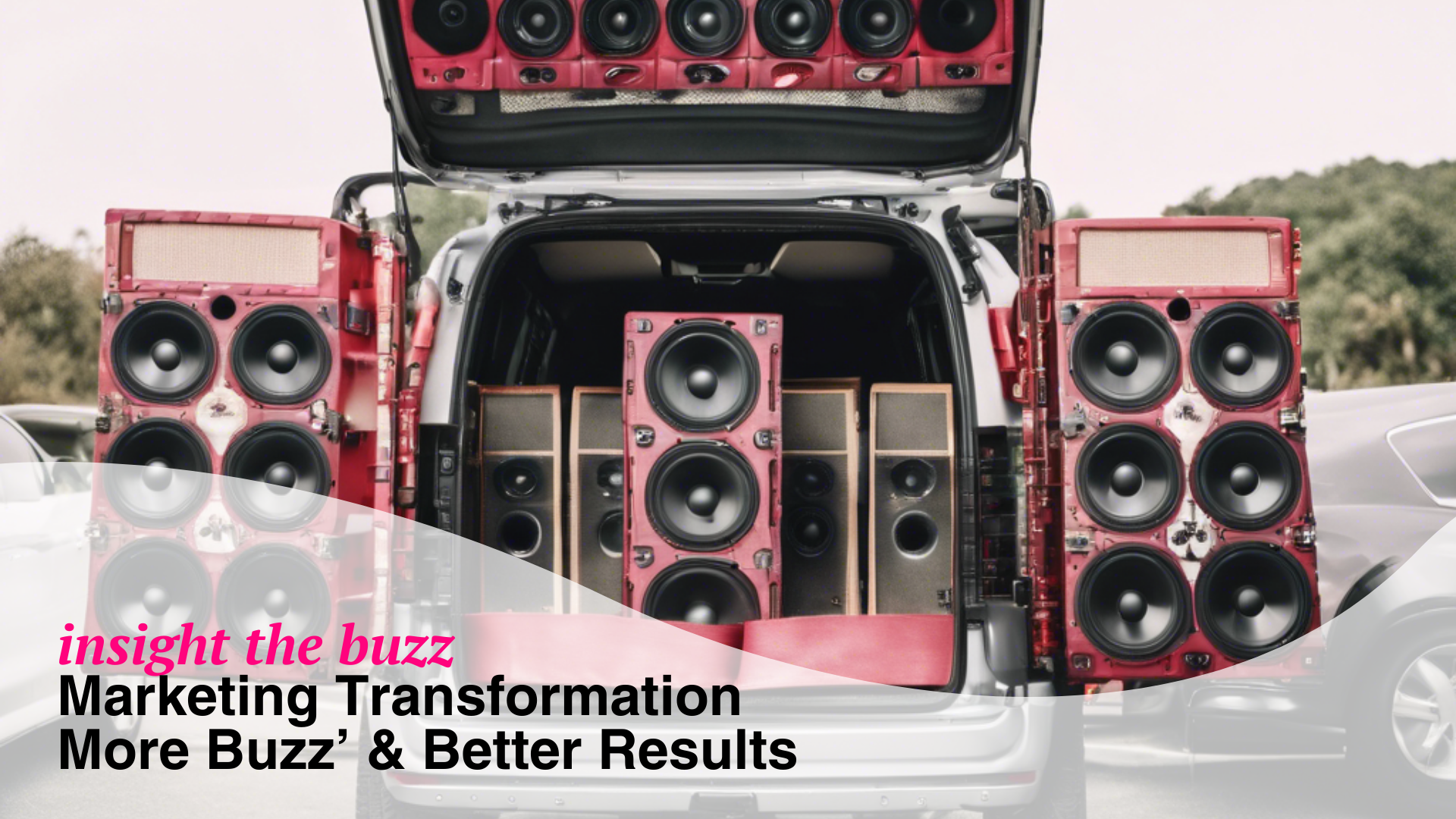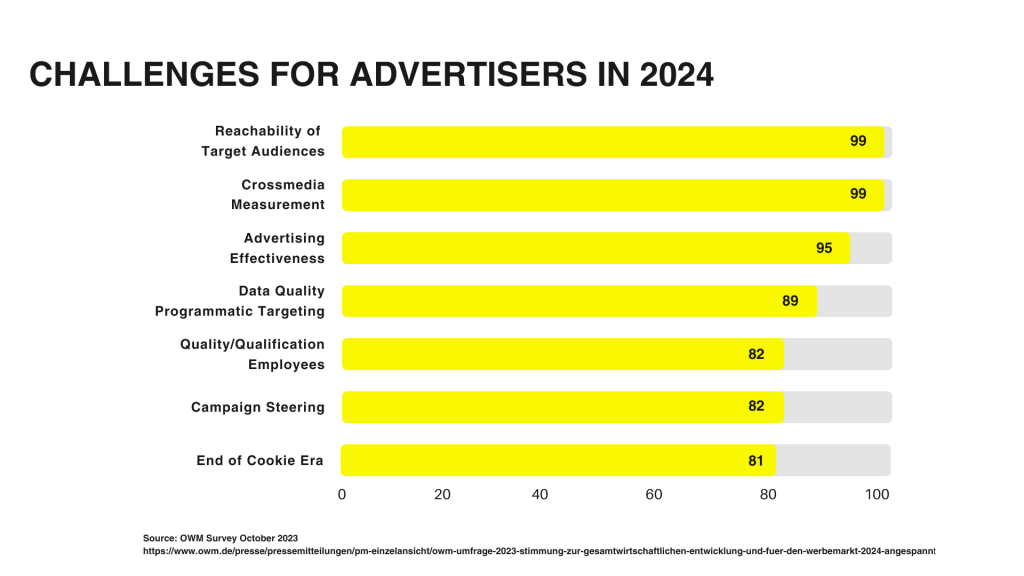
Winning More Customer Hearts Through Marketing Transformation
Marketing needs transformation
Advertising has become increasingly complex in recent years. Corona has massively changed people’s behavior. Working from home has become established and the home has become more important. People’s movement patterns, such as the way they travel to work or their shopping behavior, have changed.
In addition, there are changes in the global political situation due to terrorist attacks and wars, as well as associated crises such as the energy and refugee crisis. Inflation is hitting many people hard, and the global climate crisis is looming over everything. The current period is characterized by one thing above all: uncertainty.
These changes are also having an impact on consumer behavior. Customers have become more price-sensitive, and information-gathering behavior and decision-making processes have changed. Advertisers have to react accordingly. Marketing decision-makers are under high budget pressure and have to deal with KPIs. In this dynamic market landscape, they recognize the need to expand internal resources and digital marketing expertise to keep pace with changing consumer needs.
Data silos, uncooperative behavior from competing departments and lengthy processes with internal data protection and IT security often lead to frustration among employees. The frequently propagated agility and speed fall by the wayside.
External partners who offer precisely this agility and speed are supposed to provide a remedy. They often use their own marketing technology (MarTech) platforms to manage campaigns, calculate target group models, measure and optimize measures.
Transparency and traceability in terms of prices, media quality and advertising impact are often lacking. Neutral comparative measurement is often not desired.
When the OWM (Organization of Advertising Companies in the German Brands Association) asked its members in October 2023 about the biggest challenges for advertising companies, the answers reflected a certain scepticism towards targeting, data quality and measurability. However, the qualification of employees also appears to be a challenge for the members of the OWM.

OMW Survey 2023 Challenges For Advertisers In 2024
Marketing needs transformation
Marketing needs to be rethought: holistically. But what does that mean? Marketing can no longer be understood as a single discipline, but must function in conjunction with sales and IT. All three areas must work hand in hand, exchange information and work to ensure that the existing budget generates more sales.
Holistic also means not just pursuing a data-driven approach that is controlled by AI and sophisticated technology platforms. The people who operate them must also be taken into account: Marketing and sales staff, IT managers, legal and security experts.
Marketing transformation can be divided into three sub-areas:
- Campaigns
- Technology
- People
The art of campaign optimization: focus on expertise, transparency and technology
Campaigns can be planned and implemented in different ways. There are many variables that influence advertising impact: Brand, offer, creation, target group, media mix, context, channel, format, timing, etc. Creating the most effective combination of these components requires a great deal of expertise in the fields of (digital) marketing, media and technology.
What was combined when, how was the budget used and in what distribution? What delivered which results? How was it then optimized? Many of these steps are not comprehensible for employees.
There is often a lack of transparency as to how campaigns are managed by external service providers (and their systems). Reporting provides results, but what do these figures say? Are the figures correct? Are the ratios of how these figures are communicated correct? A campaign audit is a good way of finding out.
This involves highly specialized experts analyzing the campaigns and examining the measures and results. They assess whether the campaign is delivering good results or whether the results just look good. If the experts come to the conclusion that the advertising measures can be optimized, they draw up a comprehensive catalog of measures, if necessary, which shows step by step how greater marketing efficiency (i.e. more sales with the same budget) can be achieved and how an optimized customer approach can be achieved.
It is often worth reviewing not only the campaign data, but also the technology that is used.
Technology builds the bridge between marketing and sales
Ideally, this technology environment is set up in-house. This means that the advertising companies acquire their own licenses for certain technology platforms. This is the only way to ensure that the data collected in these systems and the associated knowledge about the derived behavioral patterns remain the property of the company. If the advertiser uses third-party licenses via the external service providers it has commissioned, the data and know-how may be lost as soon as it separates from this service provider. This can be counteracted by in-house technology.
However, selecting the right technologies is a complex process that requires a well thought-out and long-term data strategy. Which data should be collected where? How do the individual systems exchange information? Which data models are the basis for this? How and where are measurements taken? Which system is the “single source of truth” – i.e. the higher-level system whose data serves as the basis for decision-making?
The process of selecting the right systems is complex, as there are a wide variety of requirements: Functionality, processes, prices, data protection + legal requirements and security.
In addition, many different stakeholders play a role in this process, all of whom want their interests (which sometimes contradict each other) to be taken into account. Above all, there is the budget question: can I afford the chosen system or not? Independent consultants can help to develop the right system landscape. Independent is particularly important at this point, as there are extensive commission models between technology providers and consulting service providers.
The system that is recommended is not the one that meets all requirements, but the one for which the service provider receives the highest commission.
These selection processes often take years. Another reason for this is that the specialist sides do not speak the same language and discussions about requirements and possible solutions come to nothing. This is particularly the case in the areas of data protection, IT security and compliance.
It helps here if external consultants act as translators and speed up the review process. This leads to less frustration on both sides. Assessments can be conducted faster and in a more targeted manner without violating company guidelines.
Holistic thinking with specialized expertise
Employees play the decisive role in marketing transformation. Despite the much-hyped topic of AI, the human factor is more important than ever in modern marketing. Even if many areas of campaign implementation are handled by technology and AI, it is all the more important that the people who define the parameters for a measure have more expertise. Garbage in, garbage out.
In addition, humans can take certain circumstances into account that AI cannot. It is therefore becoming increasingly important to build up more expertise within the company. The requirements for certain positions will change significantly as a result of AI. The ability to use AI tools and ask the right questions will play a greater role in the future.
These new skills need to be developed through training or workshops within the company. Employees need to learn new skills on the job. Guidance from specialized trainers is essential for this.
At the same time, a working environment must be created that recognizes an employee’s individual talents and promotes them accordingly. More emphasis must be placed on the individual and their abilities. This can only succeed if consultants understand organizations not as an organizational chart, but as a complex structure of personalities with different strengths and weaknesses.
The subtle connections between these personalities, with all their effects on the department itself, but also the neighboring departments and stakeholders involved, must be given greater consideration. Can an employee not get on with their department manager? Does the employee not feel valued? Do the requirements of the job match the employee’s skills?
There are many other questions that are asked by specially trained consultants and put into perspective. More humanity instead of “ticking boxes in the organization chart”. This is all the more important as the success of marketing transformation depends on people working and communicating with each other.
This should be taken into account when organizing marketing, sales and IT. Less against each other, more together in the same direction. Fewer silos, more shared success experiences. Faster and results-oriented. With or without AI.
Katja Berchtenbreiter
Managing Partner
